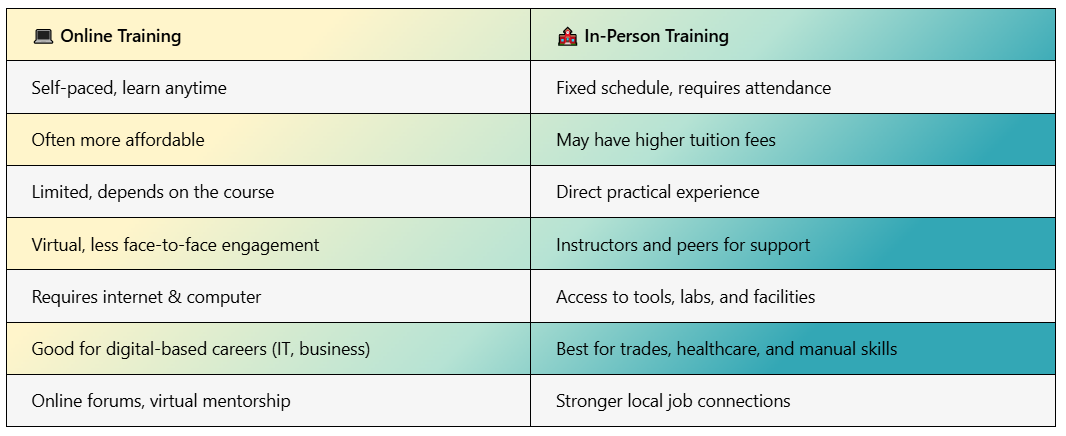
Understanding Job Skills Training Programs
Understanding job skills training programs is crucial for enhancing employability in today’s competitive job market. These programs equip individuals with essential skills and knowledge across various industries, encompassing both technical and soft skills. They can take many forms, such as workshops, online courses, and vocational training. Community colleges, for example, often provide vocational programs focused on specific trades like plumbing or electrical work, offering invaluable hands-on experience. When evaluating the best job skills training programs, prioritize those that provide practical experience and industry-recognized certifications. Key benefits of these programs include:
- Hands-on Learning: Practical training allows you to apply your knowledge in real-world scenarios.
- Networking Opportunities: Connect with industry professionals, potentially leading to job offers.
- Flexible Learning Options: Online courses and evening classes accommodate busy schedules.
- Career Support: Many programs assist with job placement after training completion. Successful examples of job skills training programs include coding boot camps that help individuals transition into tech careers and healthcare training programs preparing students for nursing or medical assisting roles.
Organizations like Goodwill and local workforce development boards also offer resources and training to aid employment. By exploring these options, you can find a program that aligns with your career aspirations and sets you on the path to success.
Start your journey to a brighter future—Enroll now!
Top Job Skills Training Programs for Career Advancement
Investing in job skills training programs can significantly advance your career by enhancing existing skills and equipping you with new, in-demand abilities. These programs can lead to better job opportunities and career growth. Here are some top job skills training options to consider:
- Community Colleges: They offer affordable vocational training programs tailored to local job markets, often including hands-on training and internships that provide valuable real-world experience.
- Online Learning Platforms: Websites like Coursera and Udemy provide a variety of courses, from coding to digital marketing, allowing you to learn at your own pace while balancing work and study.
- Workforce Development Centers: These centers offer training programs, resume workshops, and job placement services, making them ideal for those entering or re-entering the workforce.
- Trade Schools: Focused on specific trades like plumbing or electrical work, these schools often lead to certifications that enhance employability.
Participating in these programs not only boosts your skills but also builds confidence. Benefits include increased employability, networking opportunities, personal growth, and potential career advancement. In conclusion, whether through community colleges, online platforms, or vocational schools, investing in job skills training is a wise choice for career advancement.
How to Choose the Right Job Skills Training Program
Choosing the right job skills training program can be daunting due to the multitude of options available. The first step is to identify your career goals and the skills necessary to achieve them. Consider the industries that interest you and the specific roles you aspire to. For example, if technology excites you, seek programs that offer training in coding or data analysis.
Conversely, if healthcare is your passion, vocational training in nursing or medical assisting may be ideal. When evaluating programs, focus on a few essential factors. Assess the reputation of the institution by looking for reviews or testimonials from past students. Ensure the program offers hands-on experience, which is vital for applying learned skills in real-world scenarios. Here are some benefits of enrolling in a reputable job skills training program:
- Access to experienced instructors
- Networking opportunities with industry professionals
- Job placement assistance
- Flexible learning options, including online courses.
Additionally, explore local resources that can help you find suitable training. Community colleges and vocational schools often provide affordable programs tailored for job seekers. Organizations like workforce development centers can also assist in selecting the best training options based on your career aspirations. By researching and reflecting on your goals, you can find a job skills training program that enhances your employability and leads to a fulfilling career.
Benefits of Job Skills Training for Professionals
When it comes to advancing your career, participating in job skills training programs can be a game changer. These programs are designed to equip professionals with the necessary skills to thrive in their respective fields. Whether you are looking to enhance your current abilities or pivot to a new career path, job skills training offers a structured approach to learning that can lead to better job opportunities and increased earning potential.
One of the key benefits of job skills training is the practical experience it provides. Many programs incorporate hands-on training, allowing participants to apply what they learn in real-world scenarios. For instance, vocational training programs often partner with local businesses, giving students the chance to gain valuable experience while still in school. This not only boosts confidence but also enhances employability, as employers value candidates who can demonstrate practical skills. Here are some notable benefits of engaging in job skills training programs:
- Enhanced Employability: With specific skills in demand, you become a more attractive candidate to employers.
- Networking Opportunities: Many programs connect you with industry professionals, opening doors for future job prospects.
- Career Advancement: Acquiring new skills can lead to promotions and higher salaries.
- Adaptability: Training helps you stay current with industry trends and technologies, making you more versatile in the job market.
Online vs In-Person Job Skills Training Options

When considering job skills training, you typically have two main options: online and in-person programs. Each offers distinct advantages, and your choice will often depend on your learning style and schedule. Online training provides flexibility, allowing you to learn at your own pace from home, which is especially helpful for those balancing work or family commitments. Platforms like Coursera and Udemy offer a variety of courses tailored to different industries, making it easier to align with your career goals.
In contrast, in-person training programs, such as those at vocational schools or community colleges, deliver hands-on experience and direct interaction with instructors and peers. This is crucial for fields requiring practical skills, like plumbing or electrical work. Many in-person programs also collaborate with local businesses, potentially leading to job placements after graduation. Benefits of in-person training include:
- Direct access to instructors for immediate feedback
- Networking opportunities with fellow students and industry professionals
- A structured learning environment that enhances focus and discipline
Ultimately, the best choice hinges on your individual needs and career aspirations. If you thrive in a structured setting and value face-to-face interaction, in-person training may be ideal. Conversely, if you prefer flexibility and self-paced learning, online programs could be more suitable. Both paths can effectively lead you to opportunities that help you secure jobs and advance your career.
Essential Skills Covered in Job Skills Training Programs
Job skills training programs are essential for enhancing employability by equipping individuals with in-demand skills across various industries. Whether you are entering the workforce for the first time or looking to advance your career, these programs provide the necessary knowledge and experience to succeed. They cover a wide range of topics, from technical skills to soft skills, ensuring you are well-prepared for the job market. Here are some key skills typically included in job skills training programs:
- Technical Skills: These are specific abilities related to particular jobs, such as coding for IT roles or operating machinery in manufacturing. Programs often collaborate with local businesses to align training with industry needs.
- Communication Skills: Effective communication is vital in any job. Training includes workshops on verbal and written communication to help you express your ideas clearly and confidently.
- Problem-Solving Skills: Employers seek individuals who can think critically and solve problems efficiently. Many programs use real-world scenarios to develop these skills.
- Teamwork and Collaboration: Working well with others is crucial in most workplaces. Training often involves group projects to enhance collaboration.
Additionally, many programs offer resources and support for job placement, partnering with local businesses to facilitate job opportunities after training. Whether through vocational tech programs or community colleges, these resources can significantly impact your job search.
Start your journey to a brighter future—Enroll now!
Success Stories from Job Skills Training Graduates
Success stories from job skills training graduates showcase the transformative impact of these programs. Many individuals have discovered new career paths through targeted training that equips them with essential skills for today’s job market.
For example, a graduate from a local vocational training program shared how learning plumbing not only provided him with a steady income but also enabled him to start his own business. This illustrates how job skills training can open doors to new opportunities. Graduates frequently highlight the benefits they gained from these programs. Here are some key insights:
- Hands-on Experience: Many training programs offer practical, real-world experience that boosts graduates’ confidence in their abilities.
- Networking Opportunities: Participants often connect with industry professionals, leading to job placements or mentorship.
- Tailored Curriculum: Programs are designed to meet local employers’ needs, ensuring graduates are job-ready.
- Support Services: Many places that help you get jobs also provide resources like resume writing and interview preparation, facilitating a smoother transition.
These success stories remind us that job skills training is not just about learning; it is about building a future. With the right training, anyone can turn their aspirations into reality, demonstrating that investing in oneself is the first step toward a fulfilling career.
Read Also: What Organizations Can Help You Find a Job?
Cost Considerations for Job Skills Training Programs
Cost is a crucial factor when considering job skills training programs. Understanding the financial implications helps you make informed decisions about your future. Prices for these programs can vary widely based on the type of training, duration, and institution.
For example, vocational training programs, or Vo Tech programs, can cost anywhere from a few hundred to several thousand dollars. However, this investment can yield significant returns, as these programs often lead to high-demand jobs. Here are some key cost considerations to keep in mind:
- Tuition Fees: Always check what tuition covers. Some programs include materials and certifications, while others may charge extra.
- Financial Aid: Explore scholarships, grants, and loans to help offset costs. Many community colleges and vocational schools offer financial assistance to eligible students.
- Return on Investment: Assess the potential salary increase after completing the program. Research the job market to determine how quickly you can recoup your training costs.
- Hidden Costs: Remember to factor in additional expenses like transportation, supplies, and living costs during your training period, as these can add up quickly.
By considering these factors, you can choose a job skills training program that aligns with your career goals and financial situation. Investing in your skills is truly investing in your future.
Future Trends in Job Skills Training and Development
As we look to the future, job skills training and development are rapidly evolving to meet the demands of a changing workforce. With technology advancing at an unprecedented pace, acquiring new skills is crucial for individuals. Programs focusing on practical, hands-on training are gaining popularity, particularly in technology, healthcare, and skilled trades.
These programs equip participants with essential skills and enhance their employability in a competitive job market. A significant trend is the rise of online learning platforms, which offer flexibility and accessibility for learners to engage with content at their own pace. Platforms like Coursera and Udacity provide courses developed by top universities and companies, covering a range of topics from coding to digital marketing.
Additionally, vocational training programs, or Vo Tech programs, are becoming more prevalent as they offer targeted training aligned with industry needs, ensuring graduates are job-ready. Key benefits of engaging in job skills training programs include:
- Enhanced Employability: Better job opportunities post-completion.
- Networking Opportunities: Connections with industry professionals.
- Skill Specialization: Becoming experts in specific areas.
- Adaptability: Continuous learning to adapt to industry changes.
Investing in job skills training not only improves job prospects but also contributes to a more skilled workforce.
Start your journey to a brighter future—Enroll now!
FAQs
-
What is job skills training?
Job skills training provides individuals with the necessary skills, knowledge, and experience to succeed in a specific career or industry. -
Why is job skills training important?
It helps individuals gain relevant skills, stay competitive in the job market, and improve career growth opportunities. -
Who can benefit from job skills training?
Anyone looking to enter the workforce, change careers, or improve existing skills can benefit from job skills training. -
What are the different types of job skills training?
Training can include on-the-job training, vocational training, apprenticeships, certifications, and online courses. -
What are the most in-demand job skills today?
Skills like digital literacy, communication, problem-solving, leadership, and technical skills (e.g., coding, data analysis) are highly in demand. -
How long does job skills training take?
The duration varies depending on the program; some training takes a few weeks, while others may take months or years.




